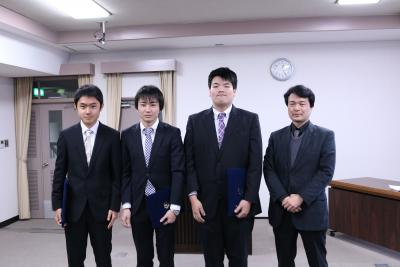The Award Ceremony of the 4th NITech English Vocabulary Contest
Category:News|Publishing : December 17, 2014
On November 20, the 4th NIT English Vocabulary Contestwas held and the award ceremony for the contest winners was held on December 16.First place was taken by Keigo Tanigawa (Mechanical Engineering, 2nd yearstudent), second place went to Ippei Ohmura (Life and Materials Engineering,1st year student), and third place went to Masahito Watari (Life and Materials Engineering, 1st year student). The prizes were awarded by the university vice-president, Professor Yasushi Ido, who also gave a speech commending the winners and all the participants. The winner of the contest, Tanigawa, gave his speech in English: "It is a great honor to be awarded this prize. I won first prize, but I'll continue to study English. This is because reading scientific papers written in English is essential to keep up with the most advanced technologies. In addition, a good command of English will help me to communicate with many researchers. Thank you for your kind attention." 
The photo shows from left to right, The third place winner, Watari, the contest winner, Tanigawa, second place winner, Ohmura, and the university vice-president, Professor Ido.
This contest is now in its fourth year and the level of interest both within and outside the university continues to rise. As the winner of this year's contest said, "reading scientific papers written in English is essential to keep up with the most advanced technologies." Science and engineering are becoming more and more international, and in order for students in Japan to compete in research and employment opportunities on a global scale, they need to be able to express themselves in English and to read academic research in English-language journals. The Vocabulary Contest addresses one facet of developing this proficiency in English. While knowing more English words is by no means sufficient to achieve communicative competency, it is a necessary condition. As students learn and use the words which form the basis of the Vocabulary Contest, it is our hope that they will bring this knowledge to life by reading and writing English for science and engineering at a much higher level. Eventually, we hope that the Contest can provide an impetus for students in Japan to move into the international arena in both their employment and research.
